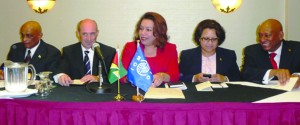By Ron Cheong

- Guyana’s High Commissioner to Canada Harry Narine Nawbatt; IOM Mission Chief Rui Reis; Foreign Affairs Minister Carolyn Rodrigues-Birkett; Honorary Consul General to Toronto Sattie Sawh and Guyana’s Ambassador to Washington, Bayney Karran at the launch



